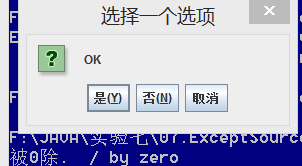(1)可以使用instanceof运算符判断一个对象是否可以转换为指定的类型:
参看实例: TestInstanceof.java
public class TestInstanceof
{
public static void main(String[] args)
{
//声明hello时使用Object类,则hello的编译类型是Object,Object是所有类的父类
//但hello变量的实际类型是String
Object hello = "Hello";
//String是Object类的子类,所以返回true。
System.out.println("字符串是否是Object类的实例:" + (hello instanceof Object));
//返回true。
System.out.println("字符串是否是String类的实例:" + (hello instanceof String));
//返回false。
System.out.println("字符串是否是Math类的实例:" + (hello instanceof Math));
//String实现了Comparable接口,所以返回true。
System.out.println("字符串是否是Comparable接口的实例:" + (hello instanceof Comparable));
String a = "Hello";
//String类既不是Math类,也不是Math类的父类,所以下面代码编译无法通过
//System.out.println("字符串是否是Math类的实例:" + (a instanceof Math));
}
}

(2)下列语句哪一个将引起编译错误?为什么?哪一个会引起运行时错误?为什么?
m=d;
d=m;
d=(Dog)m;
d=c;
c=(Cat)m;
先进行自我判断,得出结论后,运行TestCast.java实例代码,看看你的判断是否正确
判断:d=m会出错,因为基类对象不能直接赋给子类的变量;d=c会出错,因为谈们没有关系,不能赋值;c=(Cat)m会出错,因为之前进行强制类型转换了。
(3)动手动脑:请阅读并运行AboutException.java示例,然后通过后面的几页PPT了解Java中实现异常处理的基础知识。
import javax.swing.*;
class AboutException {
public static void main(String[] a)
{
int i=1, j=0, k;
k=i/j;
try
{
k = i/j; // Causes division-by-zero exception
//throw new Exception("Hello.Exception!");
}
catch ( ArithmeticException e)
{
System.out.println("被0除. "+ e.getMessage());
}
catch (Exception e)
{
if (e instanceof ArithmeticException)
System.out.println("被0除");
else
{
System.out.println(e.getMessage());
}
}
finally
{
JOptionPane.showConfirmDialog(null,"OK");
}
}
}
运行结果:

(3)动手动脑:多层的异常捕获-1
阅读以下代码(CatchWho.java),写出程序运行结果:
public class CatchWho {
public static void main(String[] args) {
try {
try {
throw new ArrayIndexOutOfBoundsException();
}
catch(ArrayIndexOutOfBoundsException e) {
System.out.println( "ArrayIndexOutOfBoundsException" + "/内层try-catch");
}
throw new ArithmeticException();
}
catch(ArithmeticException e) {
System.out.println("发生ArithmeticException");
}
catch(ArrayIndexOutOfBoundsException e) {
System.out.println( "ArrayIndexOutOfBoundsException" + "/外层try-catch");
}
}
}

(3)动手动脑:多层的异常捕获-2
写出CatchWho2.java程序运行的结果
public class CatchWho2 {
public static void main(String[] args) {
try {
try {
throw new ArrayIndexOutOfBoundsException();
}
catch(ArithmeticException e) {
System.out.println( "ArrayIndexOutOfBoundsException" + "/内层try-catch");
}
throw new ArithmeticException();
}
catch(ArithmeticException e) {
System.out.println("发生ArithmeticException");
}
catch(ArrayIndexOutOfBoundsException e) {
System.out.println( "ArrayIndexOutOfBoundsException" + "/外层try-catch");
}
}
}

(3)辨析:finally语句块一定会执行吗?
public class SystemExitAndFinally {
public static void main(String[] args)
{
try{
System.out.println("in main");
throw new Exception("Exception is thrown in main");
//System.exit(0);
}
catch(Exception e)
{
System.out.println(e.getMessage());
System.exit(0);
}
finally
{
System.out.println("in finally");
}
}
}
Finally语句块不一定会执行。
(7)编写一个程序,此程序在运行时要求用户输入一个 整数,代表某门课的考试成绩,程序接着给出“不及格”、“及格”、“中”、“良”、“优”的结论。
要求程序必须具备足够的健壮性,不管用户输入什 么样的内容,都不会崩溃。
源代码:
import java.util.Scanner;
public class Score {
public static void main(String[] args){
// TODO 自动生成的方法存根
for(;;)
{try
{
System.out.println("请输入成绩:");
Scanner s=new Scanner(System.in);
int sc=s.nextInt();
if(sc>=0&&sc<=100)
{
if(sc<60){System.out.println("不及格!");break;}
if(sc<70&&sc>=60){System.out.println("及格!");break;}
if(sc<80&&sc>=70){System.out.println("中!");break;}
if(sc<90&&sc>=80){System.out.println("良!");break;}
if(sc<=100&&sc>=90){System.out.println("优!");break;}
}
else
System.out.println("您输入的成绩有误!请重新输入");
}
catch(Exception e)
{
System.out.println("抱歉!您的操作有误!请重新输入");
}
}
}
}
